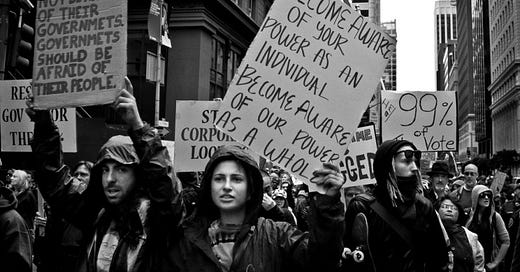Kingdom Work, Young Christian, and Pro-Life Activism
As my wife and I returned from a trip to celebrate our ten-year anniversary, we listened to Seminary Dropout's interview with Scot McKnight about McKnight's recent book, Kingdom Conspiracy. Someone recently gave me a copy of McKnight's book, but I haven't yet read any more than just a few pages here and there.
As I listened to the podcast––which mainly featured McKnight explaining multiple times what he takes to be "kingdom work" and what he doesn't think counts as "kingdom work" –– I was reminded of a recurring observation of mine.
Over the last few months, there have been several incidences of mass protests (and, in some cases, riots) over the supposed unjust acts done in cities like Ferguson, Missouri and Baltimore. It's not relevant to my essay that unjust acts were actually committed. So let's not get sidetracked on those issues. It is only important that it is widely perceived that injustice was done in these cities and others.
But during the strongest periods of protest and outrage, I noticed many younger Christians expressing support and solidarity with the protestors. People who normally don't post anything politically or socially controversial expressed their support for the protestors on social media. It's surprising, especially, when some of them had never posted anything of substance on social media.

Photo Credit: glennshootspeople via Compfight cc
But, nonetheless, they posted support. You might think that my observation has something to do with people supporting the protesting of the police brutality; it doesn't. I, too, have been appalled at what the police has done in some of these instances.
Instead, what I have observed is the great disparity between the number of conservative Christians who made public statements of support (if posts on social media qualify as public statements) for the protests and the number of Christians who make public statements supporting the pro-life agenda.
Before my politically progressive readers get upset and tell me I'm assuming that all Christians are pro-life, let me just remind you that I have singled out the conservative Christians. I'm interested in the public statements of younger conservative Christians on this topic. They voice solidarity for protests against the militarization of the police and police bruatlity against minorities (and let me emphasize that I am strongly opposed to police brutality against anyone), but they don't speak up at all about abortion. Maybe they profess to be pro-life in a hushed voice or when they are among like-minded friends. But they aren't very vocal in their support.
It's not just that the young Christians express solidarity with the recent protests. Many express support for fair trade initiatives. They are advocates for the environment. I've been at conferences where the announcement that our carbon footprint has been offset by the planting of trees was met with applause. They talk about oppression and systemic injustice and such other such things. In fact, many of the issues that younger Christians care about are the issues of the political left. (I say this not to "poison the well", but only because it is needed for a wider point that I will make later in this essay.)
Activities like these aren't just seen as good works, they are seen as "kingdom work". If you are not a Christian, or if you are a Christian but aren't familiar with the term, the phrase "kingdom work" gets thrown around a lot. As with popular (viral?) phrases, it's hard to define, not because it's completely unclear, but because it is used in so many different ways by so many different people. So let me just venture a rough definition of how it is used: Kingdom work is any activity that promotes or helps realize the rule of God and the peace and justice that comes with it.
(I'm not saying that this is how it should be defined. Scot McKnight wants it defined more stringently than this, but I haven't studied his argument deeply enough to agree or disagree with it.)
Here's the heart of my observation: I can't remember hearing a younger Christian refer to pro-life activism as "kingdom work". Can you?
Notice the oddity here. From my experience, most of these younger Christians are pro-life. They think that abortion is an issue of the destruction of a human being. Surely, when compared to, say, environmental concerns, abortion is a larger concern. Surely it's not qualitatively different than orphan relief. (And there's evidence that the early church was opposed to abortion and infanticide while providing widow and orphan relief.)
But you have many young Christians who don't publicly express their opposition to abortion, nor do they list pro-life activism among the list of things that constitute "kingdom work."
I don't have a good answer for why this is true. But I'm certain that they aren't silent about abortion because they dislike being controversial. Many of the other topics are just as controversial. So it can't be that. Perhaps it is a part of the normal distancing from parents that kids go through. Or maybe it's just that supporting these causes are in step with the culture of college students and young adults.
I want to see more social and political engagement by the church, though I want it to be an engagement that doesn't make the Christian faith subservient to one's political agenda. The religious right and the religious left are guilty of this. If offsetting the carbon footprint of conference attendees is kingdom work (and I don't actually think it is), then surely advancing the pro-life movement in the U.S.A. is kingdom work. And if we are going to speak in solidarity with protests and rallies, let's not discriminate among causes. Yes, black lives matter. But, if you're pro-life, so should the lives of the fetuses.



